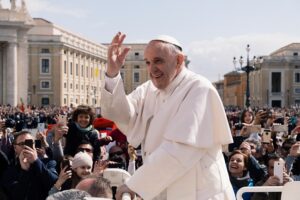Opinion: A suggestion for Indigenous leaders before they head to the Vatican
** Trigger warning: readers may be triggered by the recount of Indian Residential Schools. To access a 24-hour National Crisis Line, call: 1-866-925-4419. **

By The Honourable George Valin and Maurice Switzer
In a country whose prosperity has been built on the back of broken treaty promises, Indigenous peoples in Canada are used to seeing various levels of government squabble over who should provide them with their moral and legal entitlements.
These days they are watching Bishops waffle about providing appropriate regret and reparation for the harm caused at some 73 Catholic-operated residential schools.
The discovery of hundreds of unmarked graves at the sites of Catholic-run schools has triggered an internal Church debate about how to accept responsibility for its role in the operation of the network of schools that resulted in the settlement of the largest class-action lawsuit in Canadian history.
It has been 13 years since the federal government issued an apology in the House of Commons.
Leaders of the other religious denominations — Anglican, United, and Presbyterian churches, which operated most of the other residential schools for the federal government — have long since publicly apologized for their roles.
However, the Pope has not apologized for the Catholic Church’s role in operating schools in which thousands of Indigenous children suffered abuse at the hands of priests and nuns, and thousands more died without their parents ever learning about their fate.
The public has witnessed a series of confusing and contradictory comments from Church leaders. Some Bishops have issued personal apologies, while the Archbishop of Winnipeg, who also serves as the president of the Canadian Conference of Catholic Bishops (CCCB), complained the Church was a victim of “persecution” resulting from public outrage over the discovery of unmarked graves at former residential school sites in Kamloops and Cowessess First Nation. Other Bishops have expressed the hope that the Pope will apologize, but fail to suggest he should deliver the apology in Canada.
The debate centres around Call to Action 58 of the Truth and Reconciliation Commission, the public inquiry funded by the federal government as part of the class-action settlement. The recommendation called for an apology from the Pope and specified that he deliver it in Canada.
Following the furore over the discovery of unmarked graves, the CCCB announced that Pope Francis has invited a delegation of Indigenous leaders to meet with him at the Vatican this December.
The Pope is regarded as the supreme head and universal leader of the Catholic Church, but Church protocol requires that papal visits be at the request of a country’s bishops. The CCCB has refused to extend such an invitation or to disclose their reasons for that decision.
Indigenous peoples might wonder why their representatives would even consider travelling to a foreign state to make a plea for an apology from someone whose organization bears responsibility for the devastation suffered by thousands of their children on Canadian soil. Outgoing National Chief Perry Bellegarde of the Assembly of First Nations said there are “no guarantees” that the Indigenous delegation will meet with much if any success.
Indigenous peoples might also wonder why the Bishops of Canada arranged for a delegation of their leaders to meet with the Pope, but they did not invite the Pope to come to Canada to deliver the apology requested in Call to Action 58.
Indigenous leaders are entitled to know why Canadian Bishops could muster the collective will to invite Pope John Paul II to visit Canada in July 2002 to participate in World Youth Day but remain unable or unwilling to invite Pope Francis to come to Canada to deliver a long-overdue apology for one of the bleakest chapters in Catholic history.
They should also question how it was that Pope Francis travelled to Ireland in 2018 and apologized for a decades-long scandal regarding clerical sexual abuse of children. It is inappropriate to compare degrees of victimization, but important to note that Catholic culpability in Canada’s residential schools lasted for over a century, and has been characterized as “cultural genocide”.
There is an honourable and just way to address this dilemma. The CCCB conducts an annual Plenary each September. Indigenous leaders could consider advising Pope Francis and his Canadian Bishops that their acceptance of his invitation to travel to the Vatican this December is conditional upon the Conference first passing a motion at its Plenary that invites the Pope to come to Canada to deliver the apology requested in Call to Action 58.
The result of the vote on such a motion would demonstrate whether the Bishops of Canada are acting in good faith.
The Honourable George Valin is a Catholic who retired in 2019 after 28 years of service as a judge on the Ontario Superior Court of Justice.
Maurice Switzer is a citizen of the Mississaugas of Alderville First Nation who serves on the Indigenous Reconciliation Advisory Group of the Ontario Human Rights Commission.
Sign the petition for a Call for Papal Apology For Residential School Abuses


